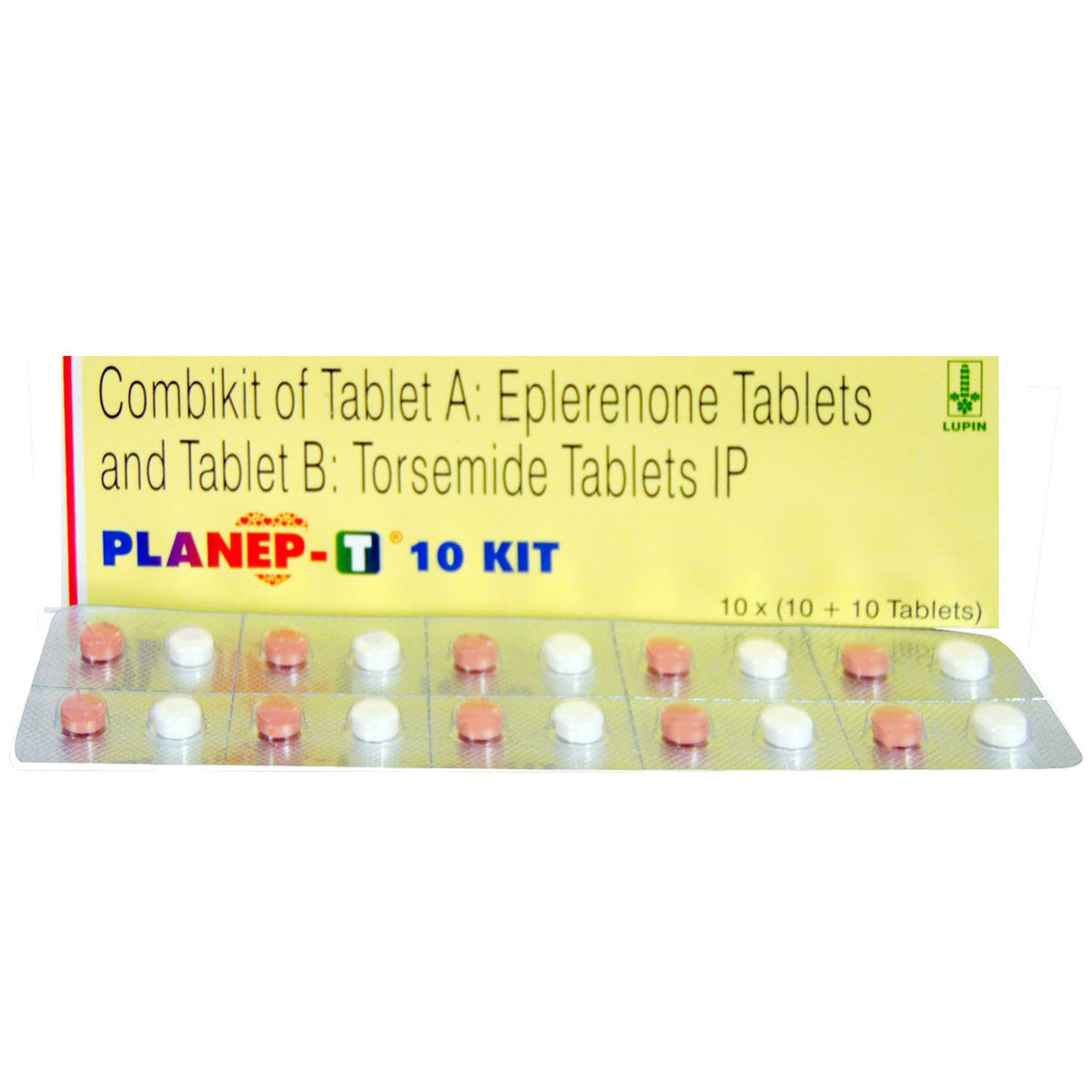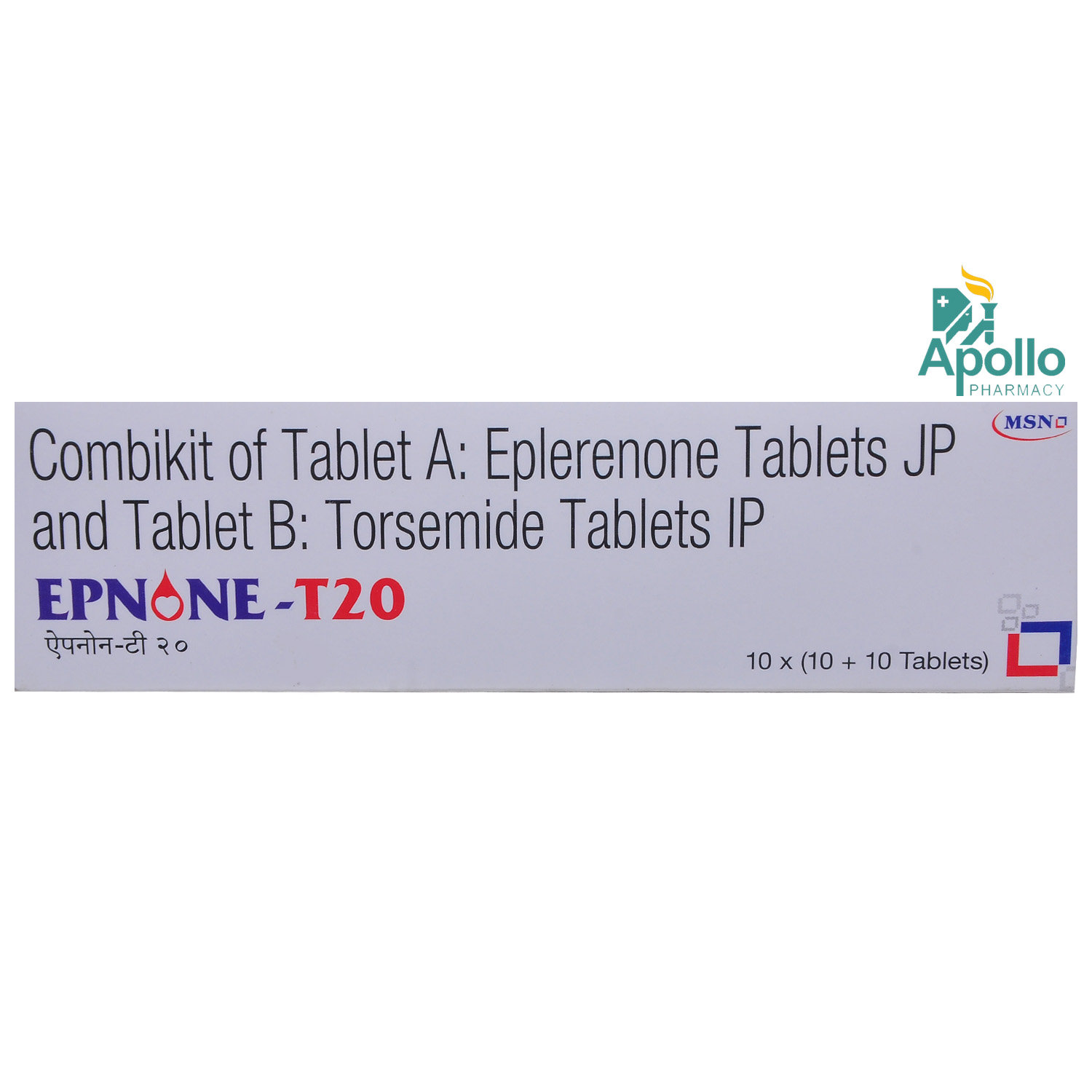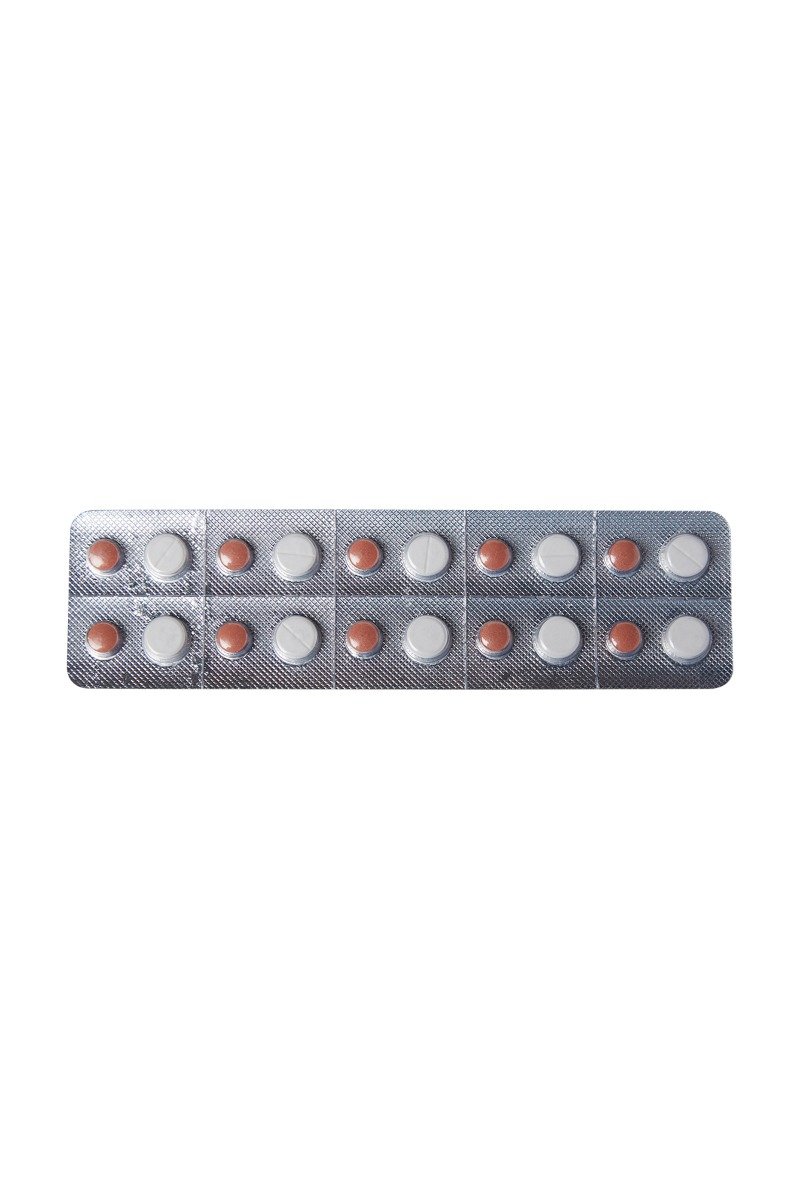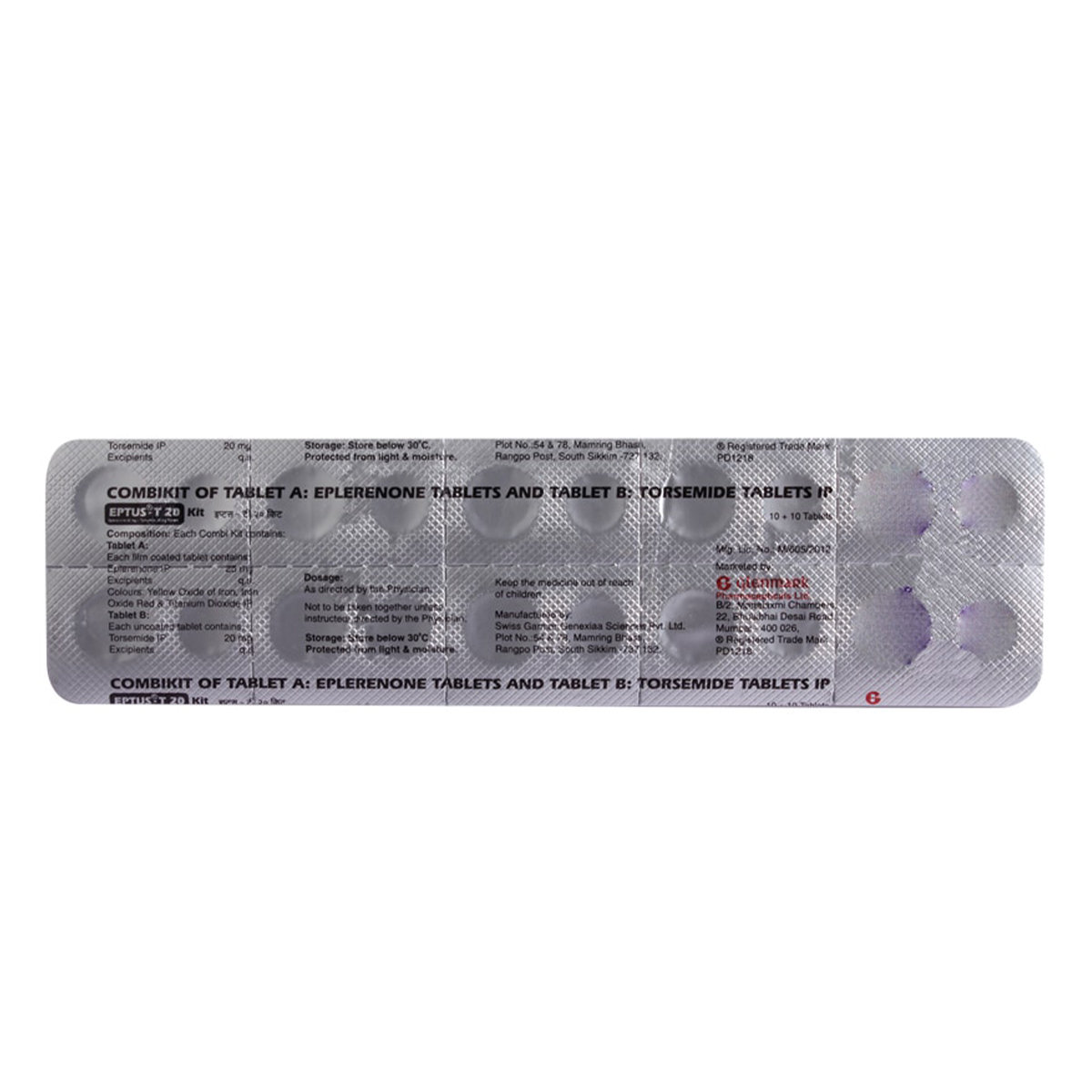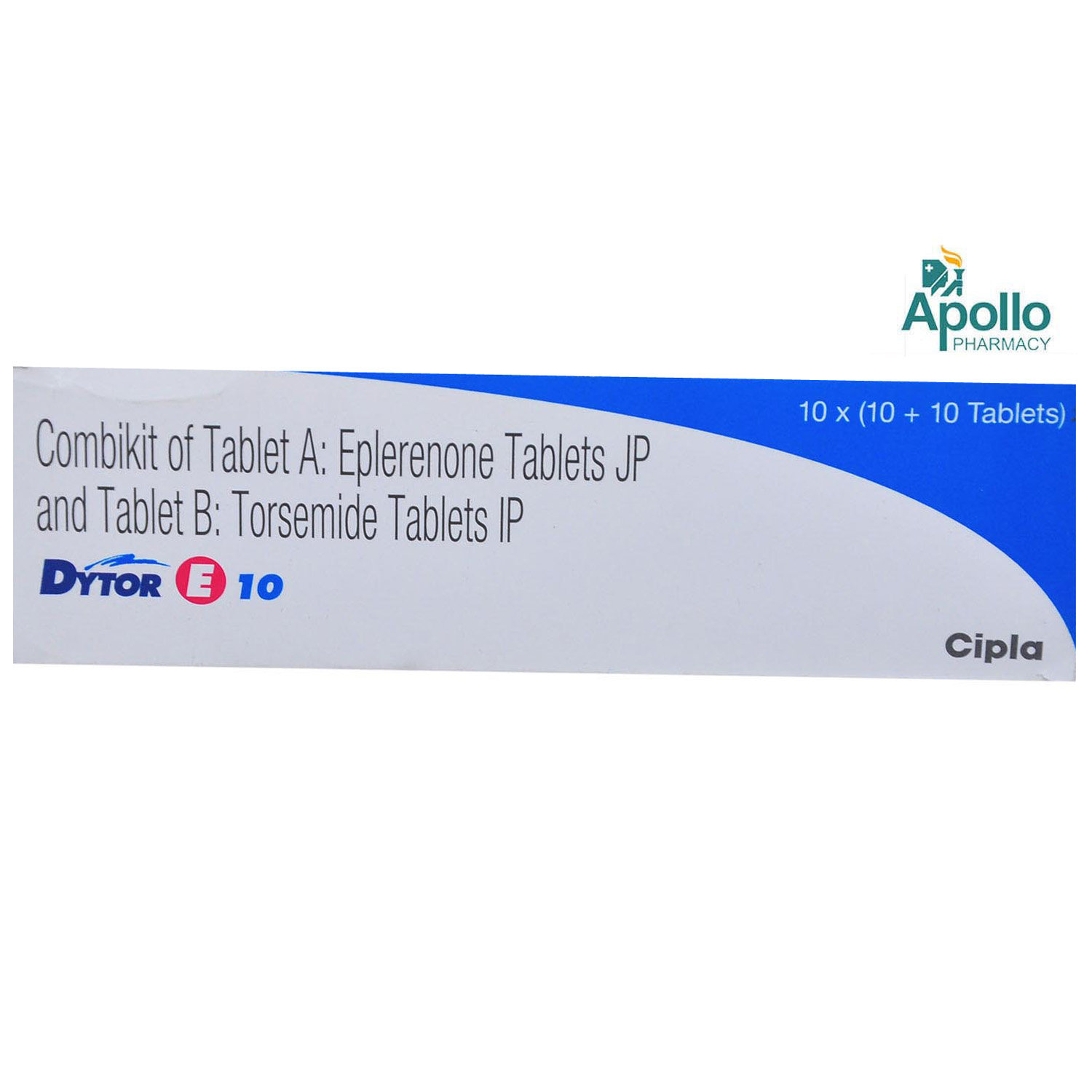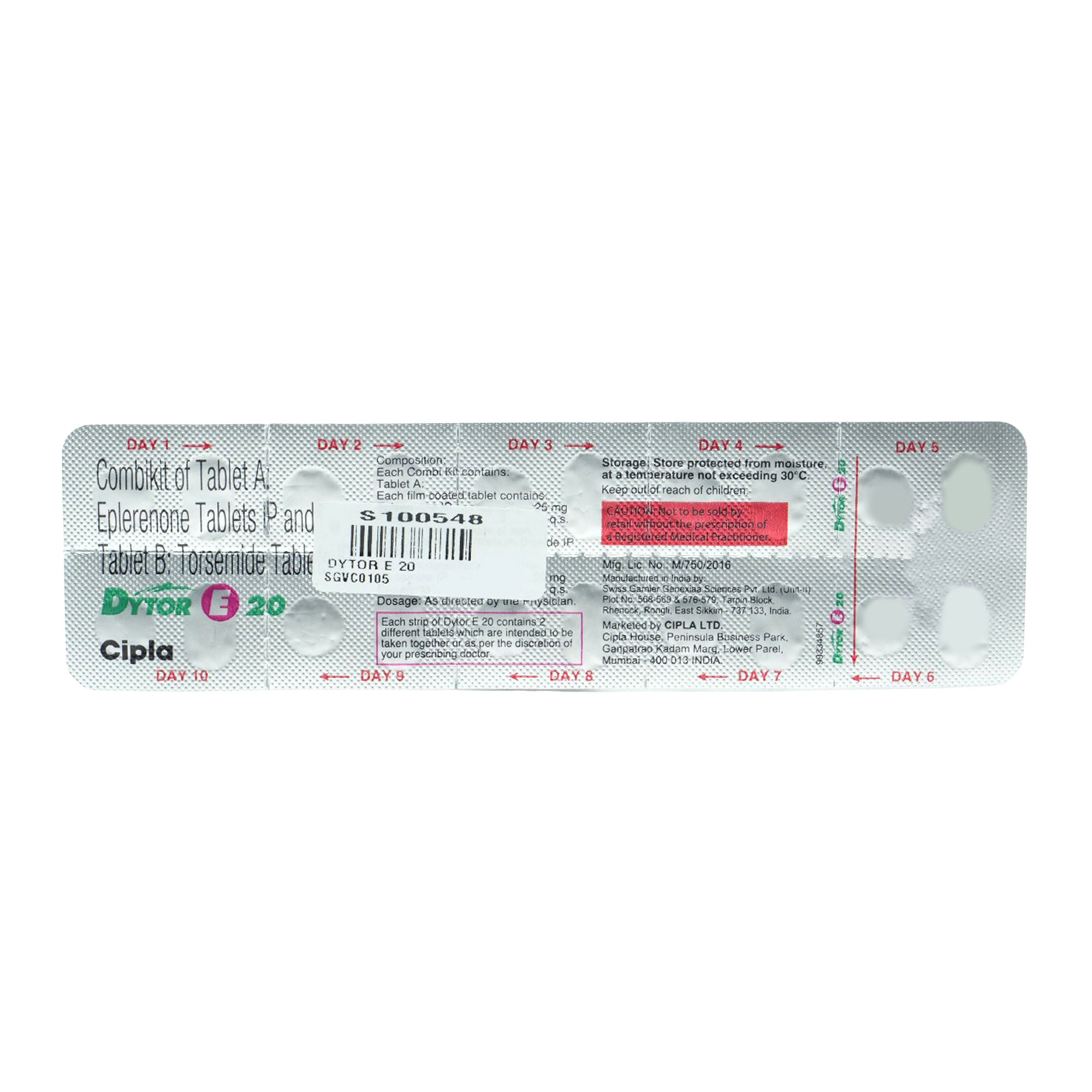Eplerenone+torasemide
About Eplerenone+torasemide
Eplerenone+torasemide belongs to a class of medicine called 'diuretics' (water pills) primarily used to remove excess water from the body. It also maintains the bloodstream's potassium level and prevents hypertension (high blood pressure) due to oedema (fluid retention). Oedema or fluid overload is associated with pulmonary hypertension (high blood pressure in the lung) or heart failure (irregular heart pumping). Leg swelling is the main characteristic of oedema, accompanied by shortness of breath, chest pain (angina), abnormal heart rhythms (arrhythmia) and swelling in other hands or abdomen areas.
Eplerenone+torasemide is a combination of medications containing Eplerenone and Torsemide, which are prescribed for the treatment of resistant oedema (fluid overload) associated with pulmonary hypertension (high blood pressure in the lungs), heart failure and hepatic cirrhosis (chronic liver damage). Eplerenone+torasemide works by increasing the amount of urine that is passed out from the kidneys. It effectively reduces excess fluid levels in the body and treats oedema (swelling) associated with heart, liver, kidney or lung disease. This reduces the heart's workload and makes the heart more efficient at pumping blood throughout the body. Thus, it also helps lower high blood pressure, reducing the chances of any future heart attack, stroke or angina (chest pain) in the future.
Take Eplerenone+torasemide as prescribed by your doctor. Depending upon your medical condition, you are advised to take Eplerenone+torasemide for as long as your doctor has prescribed it for you. In some cases, you may experience dehydration, electrolyte disturbances (calcium, magnesium, and sodium), constipation, itching, and increased uric acid. Most of these side effects of Eplerenone+torasemide do not require medical attention and gradually resolve over time. However, if the side effects are persistent, reach out to your doctor.
Try not to stop taking a Eplerenone+torasemide of your own, as doing so may raise your blood pressure, thereby increasing the risk of heart disease and stroke. Inform your doctor if you are suffering from kidney, liver or heart disease. If you are pregnant or breastfeeding, please tell your doctor so that the dosage of Eplerenone+torasemide can be prescribed accordingly. Please tell your doctor if you are taking any other medicines or are allergic to the Eplerenone+torasemide. Reducing the amount of table salt (sodium chloride) in your food often relieves the body's swelling.
Uses of Eplerenone+torasemide
Medicinal Benefits
Eplerenone+torasemide is primarily used to remove excess water from the body. It also maintains the bloodstream's potassium level and prevents hypertension (high blood pressure) due to oedema (fluid retention). Eplerenone+torasemide is a combination of medications containing Eplerenone and Torsemide. Both Eplerenone and Torsemide are diuretics and are prescribed for the treatment of resistant oedema (fluid overload) associated with pulmonary hypertension (high blood pressure in the lungs), heart failure and hepatic cirrhosis (chronic liver damage). Eplerenone+torasemide works by increasing the amount of urine that is passed out from the kidneys. It effectively reduces excess fluid levels in the body and treats oedema (swelling) associated with heart, liver, kidney or lung disease. This reduces the heart's workload and makes the heart more efficient at pumping blood throughout the body. Thus, it also helps lower high blood pressure, reducing the chances of any future heart attack, stroke or angina (chest pain) in the future.
Directions for Use
Storage
Side Effects of Eplerenone+torasemide
- Dehydration
- Electrolyte disturbances (calcium, magnesium, and sodium)
- Constipation
- Itching
- Increased uric acid
Drug Warnings
Eplerenone+torasemide should not be given to the people allergic to Eplerenone+torasemide, have low blood pressure (less than 90 mm of Hg), have had a heart attack, kidney disease (with creatinine clearance less than 30 mL/min), liver disease, pregnant women, or planning to get pregnant and breastfeeding women. Besides this, it is contraindicated in low blood pressure (hypotension), cardiogenic shock (sudden stopping of blood flow to the heart), and aortic stenosis (heart valve problem). Eplerenone+torasemide can pass into breast milk, but its effect on the baby is unknown, so it is better to tell your doctor if you are taking Eplerenone+torasemide and breastfeeding. Dehydration with electrolyte and acid-base disturbances must be corrected before using Eplerenone+torasemide. Do not take any extra potassium supplements or potassium-rich foods such as bananas and broccoli with Eplerenone+torasemide. It may lead to an excessive increase in blood potassium levels (hyperkalemia). Please take Eplerenone+torasemide at least 4 hours before sleeping to avoid frequent urination at night.
Drug Interactions
Drug-Drug Interactions: Eplerenone+torasemide may interact with other high blood pressure-lowering pills (metoprolol, ramipril, hydrochlorothiazide, rosuvastatin, atorvastatin), and it can lower your blood pressure leading to severe condition. Besides this, it also interacts with medicine to treat blood thinners (aspirin, warfarin), anti-epilepsy medications (carbamazepine, phenobarbital), immune-suppressing drugs (cyclosporine), painkillers (ibuprofen), azole antifungals (ketaconazole, itraconazole), HIV protease inhibitors (nelfinavir, ritonavir).
Drug-Food Interactions: You are recommended not to consume alcohol with a Eplerenone+torasemide to avoid unpleasant side effects.
Drug-Disease Interactions: Eplerenone+torasemide may interact with disease conditions, including cardiogenic shock (when the heart fails to pump required blood to the body), heart valve problem (stenosis), low blood pressure (hypotension), coronary heart disease, liver disease, or heart failure, low serum potassium (hypokalemia) and patients with nil urine output (anuria).
Drug-Drug Interactions Checker List:
Safety Advice

Alcohol
cautionYou are recommended not to consume alcohol along with Eplerenone+torasemide to avoid unpleasant side effects.

Pregnancy
cautionEplerenone+torasemide should not be used when pregnancy unless clearly necessary. So, inform your doctor if you are pregnant or suspect pregnancy. Your doctor will weigh the benefits and potential risks before prescribing Eplerenone+torasemide.

Breast Feeding
cautionEplerenone+torasemide should not be used in nursing mothers unless clearly necessary. So, inform your doctor if you are a nursing mother. Your doctor will weigh the benefits and potential risks before prescribing Eplerenone+torasemide.

Driving
cautionIt is not recommended to drive after taking Eplerenone+torasemide as it may occasionally cause drowsiness due to orthostatic hypotension (sudden drop in blood pressure on standing from lying position).

Liver
cautionEplerenone+torasemide to be taken with caution, especially if you have a history of Liver diseases/conditions. Your doctor may adjust your dose depending on your current kidney conditions.

Kidney
cautionEplerenone+torasemide to be taken with caution, especially if you have a history of Kidney diseases/conditions. Your doctor may adjust your dose depending on your current kidney conditions.

Children
unsafeEplerenone+torasemide is not recommended for children below 12 years of age.
Habit Forming
Diet & Lifestyle Advise
- Consume antioxidant-rich food. Blueberries, cherries, tomatoes, squash, and bell peppers are high in antioxidants.
- Eat natural diuretic foods. Asparagus, beets, green beans, grapes, onion, leafy greens, pineapple, leeks, pumpkin, and garlic are all-natural diuretic foods.
- Use healthy cooking oils like soybean, olive, canola, and coconut oil.
- You should avoid refined foods such as white bread, spaghetti, sugar, and red meat.
- Reduce or eliminate Trans fatty acids, which are found in commercially baked items such as cookies, cakes, crackers, French fries, onion rings, doughnuts, and processed foods.
- Avoid the consumption of too much salt or salty food.
- Keep your weight under control with a BMI of 19.5-24.9.
- Regular physical activity or exercise like walking improves your blood flow.
- When possible, elevate your legs or the swollen area on a chair or pillows.
- Avoid standing or sitting for extended periods of time.
- Avoid chronic stress, as it can raise your blood pressure.
- Spend time with your loved ones to cope with stress and practice mindfulness techniques.
- Quitting smoking and alcohol consumption is the best strategy to lower the risk of many health complications.
Special Advise
- Treatment with Eplerenone+torasemide requires regular monitoring of serum potassium, sodium and creatinine levels.
- Monitor your blood pressure daily and if there is too much fluctuation, then immediately contact your doctor.
- Regular monitoring of uric acid in patients with gouty arthritis.
Patients Concern
Disease/Condition Glossary
Oedema: Oedema or fluid overload is associated with pulmonary hypertension (high blood pressure in the lung) or heart failure (irregular pumping of the heart). The main characteristics of oedema are leg swelling, shortness of breath, chest pain (angina), abnormal heart rhythms (arrhythmia) and swelling in other hands or abdomen areas.
FAQs
Eplerenone+torasemide works by increasing the amount of urine that is passed out from the kidneys. It effectively reduces excess fluid levels in the body and treats oedema (swelling) associated with heart, liver, kidney or lung disease. This reduces the heart's workload and makes the heart more efficient at pumping blood throughout the body. Thus, it also helps lower high blood pressure, reducing the chances of any future heart attack, stroke or angina (chest pain) in the future.
Oedema, also known as dropsy, is the medical term for fluid retention in the body. The build-up of fluid causes affected tissue to become swollen. The swelling can occur in one particular part of the body – for example, as the result of an injury – or it can be more general. This is usually the case with oedema that occurs as a result of certain health conditions, such as heart failure or kidney failure. If it does not subside, please consult your doctor immediately.
The main side effect of Eplerenone+torasemide is peeing (urination) more often than normal. Most people need to pee about 30 minutes after taking Eplerenone+torasemide and again within a few hours. Do not take Eplerenone+torasemide before going to bed, or you may have to wake up at night to go for urination frequently.
Yes, the Eplerenone+torasemide is known to cause dehydration (excessive loss of fluids). The patient may experience dry mouth, decreased urine output, excessive thirst, and hypotension (decreased blood pressure). So, please increase the intake of fluids to avoid extreme dehydration.
Yes, Eplerenone+torasemide can cause increased potassium levels (hyperkalemia), especially in patients with kidney problems or if you are taking potassium supplements along with Eplerenone+torasemide. Please monitor your electrolyte level regularly to avoid increased blood potassium levels.
Yes, Eplerenone+torasemide may occasionally cause dizziness due to orthostatic hypotension (sudden drop in blood pressure on standing from lying position) or passing out. To lower the chance of feeling dizzy or passing out, rise slowly if you have been sitting or lying down.

